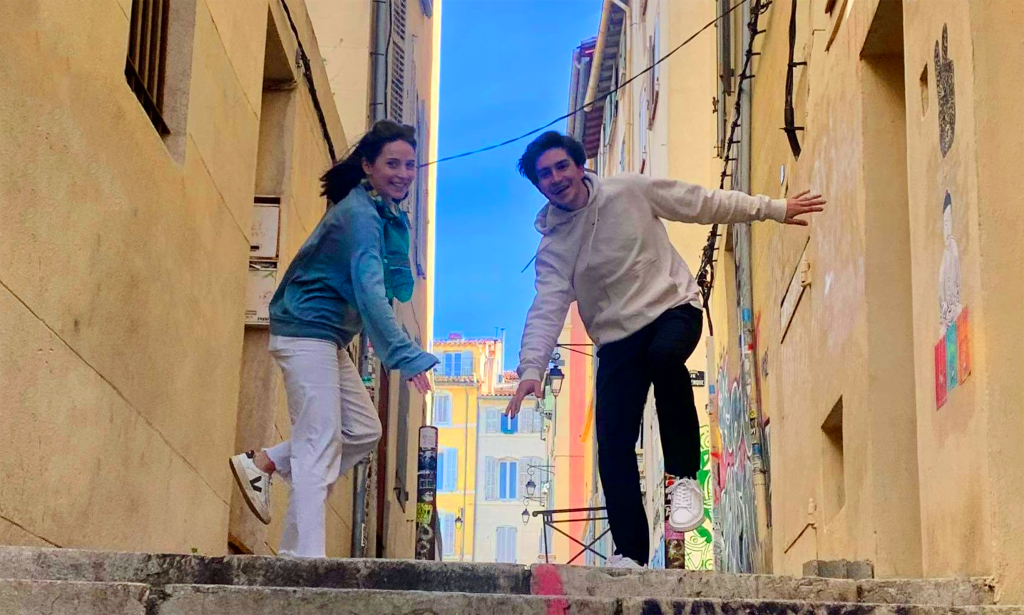To round off our tour of France in style, we landed in Marseille, home of the late Plus Belle La Vie and Jul’s clips on the Vieux Port. A weekly reminder: Nausicä is a project we launched to highlight best practices and innovations in the environmental transition of audiovisual productions. Over the course of five months, we’re going to meet the players who are moving the lines in France and Europe. Here’s what we’ve learned from this week spent under the aegis of the Good Mother.
Structuring sustainable filming in the region
To find out how things work in the region, we went to meet the Commission Régionale du Film de la Région Sud Provence-Alpes-Côte d’Azur, where we were welcomed by Caroline Warin. The region hosts almost 6,000 days of filming every year, including 1,400 in Marseille. In the past, film shoots in the region fell between November and February, but with the increase in filming activity, it is now possible to shoot all year round, thanks to the mild weather. Key locations attract film shoots, such as the streets of Marseille’s Panier district, the Calanques or the unmissable Provence Studios, which limits its environmental impact with photovoltaic panels, rainwater harvesting and beehives. Benefiting from this strong dynamic, the region can boast full employment for technicians.
Now, let’s talk sustainable filming.
The Commission is following in the footsteps of the CNC. Very soon, the Region will be requesting a provisional carbon footprint for all applications for production aid, and, a posteriori, a definitive carbon footprint as well as a report on the measures taken during production. This will enable data to be fed back on the actions carried out and the service providers involved.
Eventually, the idea is to add a green sticker for green service providers to the region’s directory of service providers. In Provence-Alpes-Côte d’Azur, we also need to reconcile film shoots with the protection of biodiversity, the sea and the many protected natural areas. This is a major concern for the Region, which has launched a Climate Plan for all its policies.
If you’ve been following our tribulations, you’ve no doubt noticed that one of the most important dialogues in the implementation of eco-production measures is that established at territorial level. And that’s exactly what the Commission de la Région Sud is planning to do: create a guide for the communes of the South East, to raise their awareness of the need to host film shoots, and thus facilitate dialogue, particularly on the issue of eco-production. The aim? A better understanding of infrastructures and the solutions that could be put in place to make life easier for everyone. The Association Régionale des Techniciens du Sud (ARTS), a regional association of over 700 technicians, is also active on this issue. One Tuesday a month, the association organizes discussions on various themes, and eco-production was the subject of several of these discussions initiated by its « ecology on location » commission. Guest professionals, such as production manager Eric Védrine, were on hand to raise awareness among the technicians in attendance. ARTS is also responsible for the new cinema logistics base project, which will be able to accommodate up to six shoots at the same time, from the end of 2023. The Hangar du Cinéma is a project of « reasoned architectural rehabilitation »: reuse of rubble from demolition, lighting fixtures, furniture, sanitary equipment designed to be dismantled and mobile, installation of rainwater tanks…
Promising companies
Pess Energy. We’re not going to make any puns about the fact that this Marseille-based start-up will undoubtedly be « pessing » heavily in the years to come. They’ve come up with a solution designed specifically for the cinema: easily transportable, ultra-strong batteries, boosted up to 6000 W. A quiet alternative to generators. Their products, the Bobine and the Wattman, weigh 50 kg and 85 kg respectively, but having tried them out, they’re so well balanced that you feel like you’re pulling your little brother’s schoolbag. And these batteries have a real ecological advantage! With the exception of the battery, the components of these storage solutions are sourced from the French and European markets. The company also ensures that its distributors are able to repair faulty products. So there’s no need to send the product back to Marseille, or even worse, to Asia, if it breaks down. So there’s an emphasis on short circuits and European techniques and know-how, which, admittedly, is not commonplace in the electronics industry. What’s more, Pess Energy has just launched the « Ekla » mobile solar solution, which recharges batteries cleanly! The circle is complete.
In the short circuit family, we’d like to introduce you to the Sud Costumes team, Anaïs, Albane and Laëtitia, whom we met in a café in the Panier district. Their project? To offer a local rental solution for costumes and equipment, avoiding the need for round-trips to the four corners of France, and providing a range of services better suited to local shoots, especially for small and medium-sized projects. In addition to renting costumes, they want to provide a sewing and patina workshop. This project has three main objectives: to reduce purchases, to reduce travel by centralizing inventory, fittings and alterations, and to provide a service to the profession, in particular costume designers and stage managers. Added to this ecological commitment is a social commitment. The company’s aim is to be part of the social and solidarity economy (SSE), and to create jobs for the unemployed. The project is still in its construction phase, already well advanced, and benefits from a great deal of moral support, notably from the region’s technicians, via ARTS, and from the Aix Marseille Provence metropolis. The team is currently looking for funding and a place to store all the costumes, so don’t hesitate to contact them!
After opening a boutique in the 14th arrondissement in 2008, followed by a 3,000m2 warehouse in Pantin, La Réserve des Arts opened La Grande Halle in Marseille, a 600m2 warehouse to meet the needs of the south of France’s appeal in terms of film shoots. Jeanne Ré explains that the team recovers textiles, sets and materials from fashion houses, theaters, museums, film shoots, etc. The ressourcerie then recycles the materials and offers them for sale at around 1/3 of the original price. You’ll find frames, carpets, haberdashery, raw materials… a veritable Ali Baba’s cave! In addition to this approach to reusing materials, every four months the structure welcomes three artists in residence, who make direct use of waste materials and contribute to the reflection on eco-design. La Réserve also offers training courses in eco-design, sewing, etc. La Réserve is aimed at cultural professionals: production companies, students, events companies, theaters…
And what happens on the set?
To answer this question, we headed for the Vieux Port, where we met Mathieu Thill, freelance eco-manager, in action on the set of À Fleur de Peau, a film produced by France Télévisions. Mathieu has two main missions: to set up tools to reduce waste production on the set, and to draw up a carbon footprint as well as a balance sheet of waste produced and recycled. He is basing his action plan on the Ecoprod label. Whenever possible, Mathieu takes the time to call each station manager in advance of the shoot to explain his approach and work out an eco-production strategy together.
Of course, the region’s inevitable player is Provence Studios. Olivier Marchetti explained the many commitments of his structure, which hosts numerous film shoots. Be careful, it goes fast. One of the studios’ biggest expenses is energy. To alleviate this problem, the Provence Studios premises are equipped with 28,000 m2 of solar panels, producing 3.6 MGW. 100% of the vehicles at the studios are electric. What’s more, the studios offer a number of services that support sustainability. Provence Costume offers 1,500 linear meters of costumes from end-of-shoot buyouts. Provence Décoration recovers, repairs and rents out all accessories, furniture and fabrics, and has already built up a stock of over 6,000m2. The RotaClean system also cleans paintbrushes in a closed circuit. And what’s new! A partnership has been set up to intervene at the end of shoots and attempt to recycle and sort all waste associated with sets and shoots. Want some more? Four goats and Bob Dy the donkey are responsible for clearing the brush.
We also had the opportunity to chat with Frédérique Sussfeld, a consultant and researcher specializing in the narrative of ecological transition, in parallel with her work on the shoots. She presented her research project on the theme of « Fiction and Biodiversity ». Her guiding question is: « How can we incorporate nature into the script, direction and production without distorting the film’s diegesis? Instead of buying a « bouquet of flowers », the character will buy a « bouquet of ranunculus ». Instead of going for a walk in a « forest », he’ll go for a walk in a « birch forest ». She also advocates the use of natural sounds in certain cases, rather than the ever-increasing use of music, which loses credibility. What a pity, » she says, « all these missed appointments with nature! « she says. As you can imagine, her aim is to relearn how to name, hear and see species. She will be conducting her first tests on two episodes of Alex Hugo, a France Télévision series, accompanied by 8 researchers in Information and Communication Sciences. To go further and study audience reception, she is looking for funding. In the meantime, she proposes to introduce authors to these issues.
And that’s the end of our tour of France! What’s next? We’ll soon be publishing a non-exhaustive list of our encounters to keep track of all these initiatives. But give us a little time, because the Nausicä adventure isn’t over yet! We’re now off to explore initiatives abroad: the UK, Belgium, Denmark, Sweden, Germany, Italy and Spain.
The links below are in French
Région Sud
crf@maregionsud.fr
Yamina Lamara : ylamara@maregionsud.fr
Caroline Warin : cwarin@maregionsud.fr
PESS Energy
Rémi Pillot
contact@pessenergy.com
Sudcostumes
Anaïs Derderian : 06 28 54 33 07
Albane Fleury de Witte : 06 86 46 65 46
Laëtitia Pommier
sudcostumes@gmail.com
La Réserve des Arts
Jeanne Ré
https://www.lareservedesarts.org/en_GB
contact@lareservedesarts.org
Eco-manageur
Mathieu Thill
mathieuthill@gmail.com
Provence Studios
https://www.provence-studios.com/
contact@provence-studios.com
Consultante et chercheuse indépendante en SIC, spécialisée sur les narrations de la transition écologique, associée au laboratoire IMSIC
Frédérique Sussfeld
frederique.sussfeld@gmail.com
Thanks to our sponsors !



Laisser un commentaire